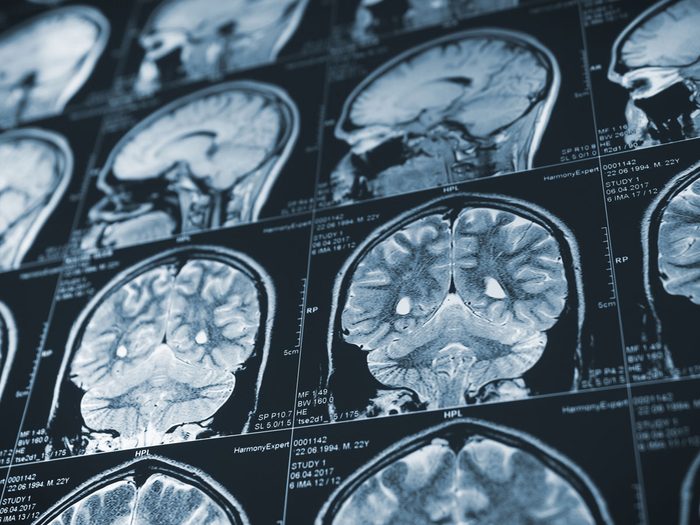
Understanding Alzheimer’s
Researches are beginning to make breakthroughs in understanding this form of dementia, but actual treatments are proving elusive. That’s why it’s important to understand how other diseases play a role in the risk of Alzheimer’s disease: If you have one of these conditions, you should, of course, treat and manage it if that’s an option. Will that help protect against dementia later in life? It’s possible.

Anemia
This common condition is defined by a lack of red blood cells. These cells transport oxygen in the body, which is why one symptom of anemia is persistent fatigue. Other symptoms include weakness, shortness of breath, and cold hands and feet. Some studies have found an association between anemia and an increased risk of dementia in older adults. Keep in mind that this doesn’t mean that one causes the other; they could share a risk factor. One of the most common causes of anemia is an iron deficiency, which can result from a poor diet, medical conditions, or blood loss; it may also be a side effect of certain medications.
The concern is that by depriving the brain of oxygen, anemia could increase the risk of a type of damage seen in people with Alzheimer’s disease. The results of an 11-year study published in the journal Neurology involving more than 2,500 people ages 70 to 79 suggested that those with anemia had a higher risk of developing dementia than people who didn’t have anemia. Overall, 23 percent of people with anemia developed dementia compared with 17 percent of those without it.

Depression and anxiety
“There’s quite a lot of evidence that for people who are destined to develop Alzheimer’s, sometimes the first thing you see is depression or anxiety,” explains Pierre Tariot, MD, director of the Banner Alzheimer’s Institute in Phoenix, Arizona. However, scientists say that these mood disorders may not be just a symptom of Alzheimer’s—they may actually be risk factors for developing the disease. Because depression and anxiety can elevate levels of the stress hormone cortisol, one theory is that chronically high levels of cortisol can damage the brain.
Interestingly, antidepressant drugs are being researched as a potential treatment for Alzheimer’s. “Certain antidepressants have anti-amyloid [a protein associated with Alzheimer’s] properties with enough credibility that there are two trials of antidepressants that aim to find out if we can derail the Alzheimer’s process with these drugs,” Dr. Tariot says.

Type 2 diabetes
The link between type 2 diabetes and Alzheimer’s disease is fairly strong, as this 2015 review published in Clinical Interventions in Aging demonstrates. “Diabetes is probably a risk factor for multiple reasons,” says Dr. Tariot. “Top of the list is that the disease leads to abnormal inflammatory responses in multiple organs—including the brain. Another reason is that the insulin-signaling pathway is also one of the pathways involved in the breakdown of amyloid. Finally, diabetes contributes to cerebrovascular disease [conditions that raise the risk of stroke], which is a significant factor for Alzheimer’s.” But the high blood sugar associated with type 2 diabetes can be controlled with diet and lifestyle changes, as well as insulin and oral medication when necessary, to lower the risk. For more, check out some of this year’s best diabetes breakthroughs.

Down syndrome
“The genetics are similar in Down syndrome and Alzheimer’s,” explains Elise Caccappolo, PhD, associate professor of neuropsychology at Columbia University Medical Center. “If people with Down syndrome grow old enough, they will develop Alzheimer’s.” The genetic mutation that triggers the syndrome also causes amyloid plaques—a hallmark of Alzheimer’s disease—to build up in the brain over time.

Gum disease
Gingivitis and periodontitis—gum disease—indicate the buildup of harmful bacteria in your mouth, and they’re mobile: “These bacteria can travel to the heart and brain and can cause inflammation,” explains Rudolph Tanzi, PhD, a neurology professor at Harvard University and director of Massachusetts General Hospital’s Genetics and Aging Research Unit.
Gum disease is extremely common; seven out of 10 Canadians will develop some form of it at one point in their life. Fortunately, it’s also easy to prevent (and treat). “Be religious about flossing your teeth,” says Tanzi. And get regular teeth cleanings and checkups every six months.

Hearing loss
Hearing loss doesn’t appear to cause the physical brain changes that are characteristic of Alzheimer’s disease, but it may be responsible for—and accelerate—dementia, which could make Alzheimer’s symptoms even more severe. “Any significant sensory impairment is almost certainly going to magnify or exaggerate the consequences of any cognitive impairment,” Dr. Tariot explains.
One concern is that if someone’s hearing has been bad or failing for years, it could harm that person’s brain, he says. An 18-year study led by researchers at Johns Hopkins University and the National Institute on Aging found that the worse someone’s hearing loss was, the more likely they were to develop dementia.

Herpes and other infections
Scientists are researching the connection between certain types of chronic infections, such as herpes and Alzheimer’s disease. These researchers believe that the infections may accelerate the damage of Alzheimer’s by triggering chronic inflammation, according to research published in Frontiers in Aging Neuroscience. While experts once thought the amyloid plaques found in the brains of people with Alzheimer’s disease were cellular junk, they now theorize that the plaque may be the body’s protective response to infection. The more plaques the body produces—by repeated herpes outbreaks, for example—the greater a person’s risk of developing Alzheimer’s later in life.
“At age 50, 90 percent of the population carries HHVI, the herpes cold-sore virus,” says Tanzi. “If you get a cold sore now and then, don’t panic. But if you’re one of those people who get a cold sore every month or even more frequently, you might want to seek medical attention for antiviral drugs or other therapy.” Eventually, scientists hope to develop vaccines and drugs to fight these viruses and infections more effectively.

High blood pressure
“Anything related to blood flow, including high blood pressure—in fact, anything you would see a cardiologist about—can be a risk factor for Alzheimer’s disease,” says Caccappolo. That’s because cardiovascular disease can compromise the brain’s blood supply. New research published in the journal Neurology indicates that older people whose blood pressure runs higher on average than their peers’ are more likely to develop tangles and plaques in their brains, both of which are markers of Alzheimer’s disease.
Be sure to get your blood pressure checked regularly: Your doctor can recommend lifestyle changes and medications that are an excellent way to help reduce your numbers.

Hypothyroidism
Having an underactive thyroid gland—older women have the highest risk—may not cause Alzheimer’s disease, but it can lead to memory problems that may accelerate the symptoms of dementia. Common symptoms of thyroid trouble, say experts at the Mayo Clinic, are fatigue, weight gain, constipation, and sensitivity to cold. Thyroid treatment is effective, so don’t hesitate to see your doctor about any worrisome symptoms. (FYI: Here’s what your doctor wants you to know about hypothyroidism.)

Obesity
Roughly 7.3 million Canadian adults are classified as obese, according to Statistics Canada, and the excess weight is a risk factor for type 2 diabetes, high blood pressure, and other cardiovascular problems—all of which increase the risk of Alzheimer’s disease and cognitive problems.
“If you’re overweight, not physically active, and you have the gene that predisposes you to Alzheimer’s, you’re going to have a higher probability of developing it,” says Stephen Rao, PhD, a neuropsychologist at Cleveland Clinic’s Lou Ruvo Center for Brain Health. Increasing physical activity and losing even a relatively small amount of weight can help reduce your risk factors.

Sleep apnea
The exact incidence of obstructive sleep apnea (OSA) in Canada is unknown because it is so often undiagnosed, but a study published in the Canadian Respiratory Journal estimates that at least 25 million Canadians have been diagnosed with OSA. Men are also more likely than women to have sleep apnea, according to a report in the journal American Family Journal—which is much worse than thunderous snoring. People who have sleep apnea can stop breathing numerous times throughout the night, disrupting oxygen flow to the brain and other organs.
One study published in the American Journal of Respiratory and Critical Care Medicine found that older people with sleep apnea had much higher levels of amyloid-beta, the protein involved in plaque buildup in the brain. Another study found that people with irregular breathing during sleep showed signs of developing Alzheimer’s at an earlier age. Researchers believe that treating sleep problems could help prevent or slow the progression of Alzheimer’s disease. Find out what sleep doctors wish you knew about snoring.

Vitamin deficiencies
“A vitamin B12 deficiency can absolutely cause someone to look cognitively impaired,” says Dr. Tariot. “B12 deficiency is uncommon, but we do see it in people who chronically use [drugs that help reduce stomach acid].” Some research suggests vitamin D deficiency may raise the risk of developing Alzheimer’s or dementia later in life, reports the Mayo Clinic. Talk to your doctor about your diet, your prescriptions, and your risk of deficiency; blood tests can spot trouble.
Next, find out why women are at a greater risk of getting Alzheimer’s disease.
